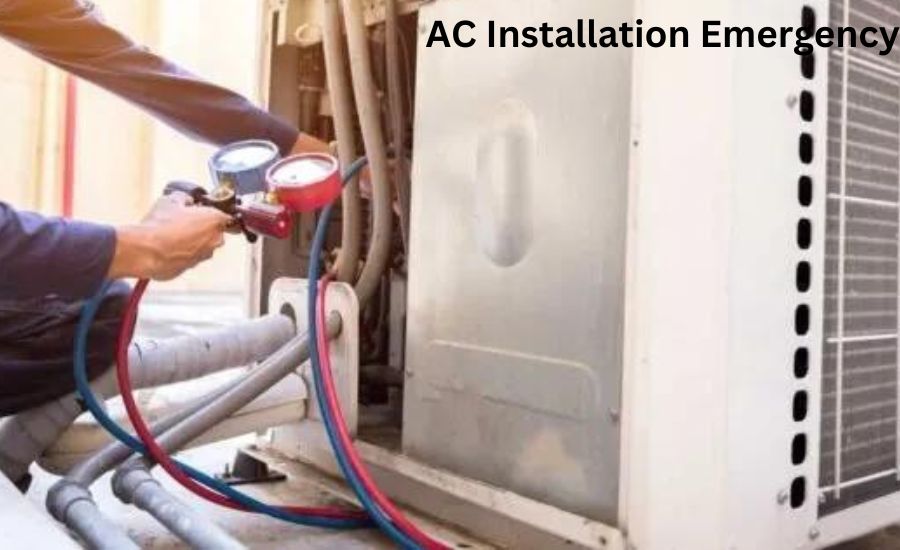Most homes now rely on air conditioning to beat the heat, making AC units more essential than ever. Panic and discomfort aren’t your only options. Learn the immediate steps to navigate the sweaty predicament of an AC installation emergency without losing your cool.
From identifying emergency maintenance issues to knowing who to call, we’ve got your back on how to swiftly and efficiently restore your comfort and peace of mind. Beltway Air Conditioning & Heating AC Installers can be a good choice for your AC needs.
Immediate Safety Measures
Turn Off Power
First, shut down the AC unit immediately to prevent any further damage. This is very important. Next, head to your home’s circuit breaker and disconnect the power supply to the AC system. Make sure the system is completely powered down before you proceed with any other steps. This action helps mitigate potential hazards.
Check for Gas Leaks
If you smell something weird near the AC, act fast. Check for gas leak signs and if you see any, leave right away and call 911.
Ensure Ventilation
To keep your home safe and fresh, open windows and doors for airflow. Use exhaust fans to get rid of hot air or smells. Don’t turn on the AC until you’ve made sure the house is well-ventilated.
Keep Children Away
It’s crucial to keep kids away from the AC unit for safety. Explain the risks to older kids and use barriers to block access if needed.
Contact Your AC Installer
Reach out to the professional who installed your AC for urgent assistance; they’re often best equipped to handle emergencies quickly.
Gather Information
Before you call for emergency air conditioning repair, make sure to know your AC’s make and model. Take note of the last time it got serviced and any problems it’s had lately. Also, write down what’s wrong now, like any error codes. This helps the technician fix it faster.
Provide Detailed Description
When you reach out to an experienced HVAC tech, be clear. Describe the issue clearly, mentioning any weird noises, leaks, or if it’s not cooling at all. Tell them if you’ve tried fixing it yourself by resetting the system or cleaning the filters. This helps the tech know what to expect and they might even give you a quick fix over the phone.
Request Emergency Service
If you need quick help, ask a licensed HVAC pro for emergency service right away. Tell them your AC is having a serious issue that needs fast fixing. Checking when the technician will arrive can help lower your stress. Fast action can stop more damage and get your comfort back sooner.
Temporary Solutions
Implement temporary solutions, like fans or opening windows, to maintain comfort until professional help arrives.
Use Fans
Portable fans are a big help when the AC stops working, especially during hot days. They make you feel cooler by moving air around. Put them near windows to pull in fresh, cool air and lower the room’s heat. But don’t plug in too many or you might cause electrical problems. Fans aren’t a complete fix but offer quick comfort, especially after a big storm when fixing AC might take a while.
Close Curtains
Blocking sunlight with curtains or blinds keeps your house cooler, especially during sunny times. Reflective window coverings are great for sunny places to bounce off heat. This helps keep things cool until your AC gets fixed.
Stay Hydrated
In emergencies, staying comfortable is important. Drink lots of water to keep cool and avoid dehydration. Skip coffee or alcohol since they dry you out. Keep a water bottle handy, especially in hot weather, to help your body handle the heat better.
Documentation and Communication
Keep detailed records of the emergency and all communications with service providers, as this documentation can be crucial for warranty or insurance claims.
Take Photos
First, take clear pictures of any damage to your AC, like leaks, broken parts, or error messages. These photos are important proof and help explain the issue to a technician. They also make it easier for a more accurate assessment before anyone checks it in person.
Note Symptoms
Write down all symptoms, like weird sounds and if it’s cooling properly. Noticing changes helps. This helps technicians find the problem quicker, leading to a faster and possibly cheaper fix.
Keep Records
Keep a detailed record of all your AC maintenance and repairs, including dates, technician names, and service details. Save all receipts and warranty information together. This helps with future fixes, keeps the warranty valid, and controls costs.
Preventive Measures
Follow preventive measures, including regular maintenance checks, to reduce the risk of future AC emergencies.
Schedule Regular Maintenance
To avoid AC problems, get a certified HVAC expert for regular check-ups. This includes cleaning coils, checking refrigerant, and inspecting ducts for issues. Stick to the manufacturer’s suggested maintenance plan to prevent small problems from getting bigger.
Replace Filters
Change your AC filters regularly, using ones that fit what the maker suggests, to keep it working well and the air clean. Set reminders to swap them out every 1-3 months to stay on track.
Monitor System Performance
Keep an eye on how well your AC unit cools and how much noise it makes. An increase in energy bills or a decrease in cooling efficiency can signal a problem. Report any persistent issues to a technician promptly. Early detection of changes can prevent bigger problems down the line.
Leverage these tips to confidently tackle any AC emergencies. The aim is to reduce disruptions and avoid future issues. Always reach out to experts when unsure; their knowledge is crucial. Have this guide ready, so you’re prepared for unexpected AC challenges. Stay calm and ready.
Stay connected with: celebriches

Jennifer David is the creative force behind CelebRiches, your go-to source for celebrity financial exploits. With an unwavering passion for the entertainment industry, she delivers in-depth insights into celebrities’ net worth, combining thorough research with a captivating narrative. Explore the stars’ fiscal journeys through Jennifer’s expert lens, where finance meets fame most engagingly.

